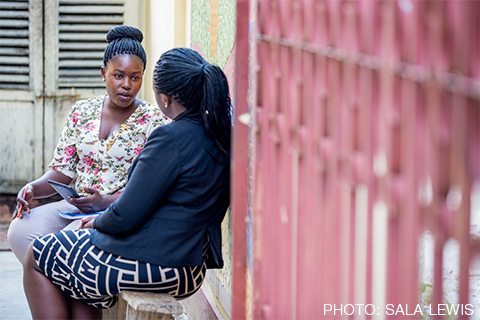 The Global Strategic Information (GSI) group at UCSF’s Institute for Global Health Sciences has been awarded a multimillion-dollar, five-year cooperative agreement with the U.S. Centers for Disease Control and Prevention (CDC) to implement routine testing for recent HIV infection to determine when, where and how participants contracted HIV/AIDS and to work with local partners to build capacity in laboratory and health information systems (HIS).
The Global Strategic Information (GSI) group at UCSF’s Institute for Global Health Sciences has been awarded a multimillion-dollar, five-year cooperative agreement with the U.S. Centers for Disease Control and Prevention (CDC) to implement routine testing for recent HIV infection to determine when, where and how participants contracted HIV/AIDS and to work with local partners to build capacity in laboratory and health information systems (HIS).
Led by George Rutherford, MD, GSI was awarded $3.65 million for the first year, and up to $10 million per year over the five-year project period.
Through a consortium that includes Vitalant Research Institute—formerly the Blood Systems Research Institute—the London School of Hygiene and Tropical Medicine, the National Alliance of State and Territorial AIDS Directors and local partners in Botswana, Haiti, Kenya, Malawi, Namibia, Uganda, and Zambia, GSI will create surveillance systems for monitoring recent infections at HIV testing sites, analyze and use the data on recent infection to track the current epidemic, target interventions, and inform the planning of prevention activities.
The ability to distinguish recent infections will play a key role in ending the epidemic by helping public health agencies to identify active networks of transmission and to find previously undiagnosed persons through case finding and partner tracing.
“This is the last frontier of the HIV/AIDS epidemic,” Rutherford said. “To reach the 95-95-95 targets and maximize case finding, programs need high-quality, real-time data to target the right interventions to the right population at the right time.” 95-95-95 refers to World Health Organization (WHO) and President’s Emergency Plan for AIDS Relief (PEPFAR) goals to identify 95 percent of people with HIV, get 95 percent of those people on antiretroviral therapy, and have 95 percent of people being treated reach consistent viral suppression. Mathematical models indicate that if the world reaches and maintains these targets, HIV transmission will gradually slow and stop.
GSI also aims to build sustainable capacity of host-country governments and local organizations to independently implement, monitor and routinely use data from the surveillance system for immediate public health action and improved programming. This work will include leveraging existing health information systems (HIS) and developing new ones where necessary to support recent HIV infection surveillance and providing technical assistance and training in implementation, HIS support, data analysis and data use.
Key to securing the CDC award, which will be administered through PEPFAR, were GSI’s long history of providing global and country-based HIV strategic information, surveillance and health informatics support, and capacity building in dozens of countries around the globe as well as GSI’s strength in developing health information systems through its Informatics Hub and UCSF’s Global Programs registered offices in Kenya, Namibia, Tanzania and Uganda.